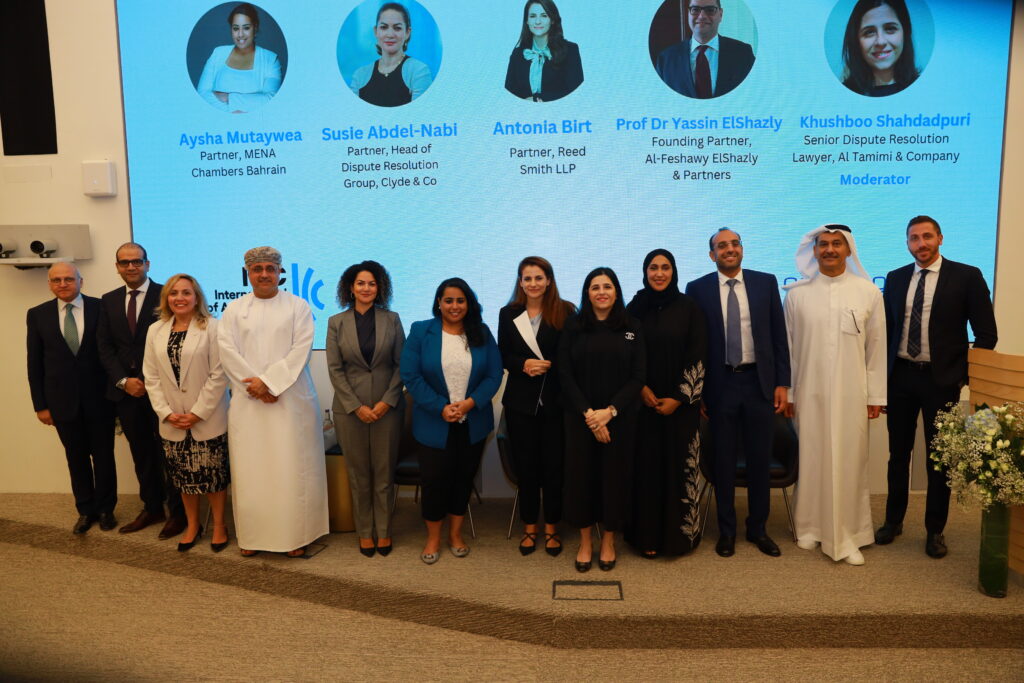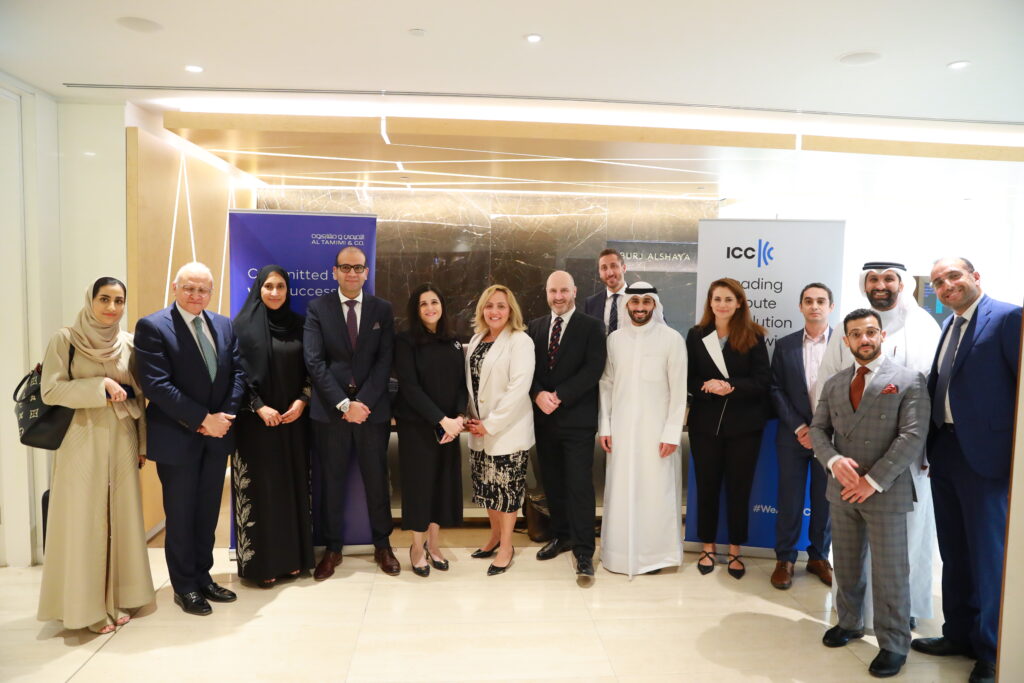
After a three-year hiatus due to the pandemic, the much-anticipated third ICC Kuwait Arbitration Day took place at the heart of Kuwait in the Burj Al Shaya Building on 5 October 2023, organised by the ICC in collaboration with Al Tamimi & Company. Following the success of the inaugural ICC Kuwait Arbitration Day conference in 2018, covered in this previous blog post, and the second conference in 2020, the third ICC Kuwait Arbitration Day brought together legal luminaries and experts from across the region to discuss and share perspectives and insights on issues touching on the arbitration landscape in Kuwait and the Middle East and North Africa (“MENA”) region.
Welcome and Opening Remarks
The event commenced with a warm welcome by Khushboo Shahdadpuri (Al Tamimi & Company), who spoke about the need for the arbitration community and stakeholders in the MENA region to come together to collaborate and progress forward collectively. Shahdadpuri also touched on the resilience and buoyancy of the Kuwaiti arbitration community in assessing the steps required to progress Kuwait’s arbitration landscape. Her welcome remarks set the tone for a day filled with meaningful discussions and the exchange of knowledge amongst legal experts.
Following Shahdadpuri’s welcome address, Essam Al Tamimi (Al Tamimi & Company) took the stage to provide a first set of opening remarks. His insightful remarks not only highlighted the significance of the conference but also delved into the future of arbitration in Kuwait. In particular, Al Tamimi’s address underscored the commitment towards promoting arbitration as an effective means of dispute resolution in the Gulf region. He emphasized the critical role that arbitration plays in fostering economic growth, maintaining investor confidence, and ensuring a fair and impartial mechanism for settling disputes. Al Tamimi also highlighted the need for continued collaboration between legal professionals, institutions, and governments to create a more arbitration-friendly environment in Kuwait. This environment, according to Al Tamimi, should be characterised by efficient procedures, transparent processes, and robust legal frameworks.
Following on from Al Tamimi, Dr. Anas Al Tourah, General Secretary of the Kuwait Chamber of Commerce & Industry’s Commercial Arbitration Centre, took the stage to provide a second set of opening remarks. Dr. Al Tourah commented on the ongoing discussions to progress Kuwait’s arbitration landscape and on the importance of selecting the most appropriate regime for Kuwait.
The stage was then set for a day of in-depth discussions on arbitration provisions in Kuwait, the jurisdiction of arbitral tribunals, securing interim/precautionary measures, and enforcing and challenging arbitral awards. Legal professionals from various countries came together to share their expertise and insights, making this conference a remarkable platform for advancing the field of arbitration in the MENA.
Keynote Address by Mohamed Shelbaya
Mohamed Shelbaya (Gaillard Banifatemi Shelbaya Disputes) presented a thought-provoking keynote address where he discussed four distinct challenges facing the international arbitration system: (1) competition between commercial and investment arbitration mechanisms; (2) unilateral sanctions and their interface with arbitration; (3) improper application of domestic laws; and (4) competition between national courts and arbitration. Shelbaya explained each one of these challenges with case laws and examples from the perspective of Kuwait. He then highlighted possible remedies for each one of these challenges and concluded with the importance of maintaining arbitration’s integrity and impartiality while adapting to the changing dynamics of international commerce.
Panel Discussions
The first panel of the day took place in Arabic. Moderated by Omar Al Qahtani (Al Tamimi & Company), this panel delved into the arbitration provisions in Kuwait, offering a comprehensive overview of the present landscape and comparative perspectives from the region. Dr. Aseel Zimmo (Bahrain Judiciary), Dr. Al Tourah, Dr. Moosa Al Azri (Oman Commercial Arbitration Centre), and Claudia Fares El Hague (Al Marri & El Hage Law Office) were part of this panel to discuss the intricacies of arbitration in Kuwait and its neighbouring countries such as Oman, Bahrain and Qatar, amongst others. The panel examined the legal frameworks, challenges, and opportunities for arbitration in the region, while shedding light on the evolving landscape.
The panel concluded with numerous questions and feedback from the engaged audience who commented on the need for continuous training and education in arbitration to ensure that practitioners remain at the forefront of global best practices. Questions were also raised on the role of Kuwait in shaping the future of arbitration in the Middle East, how the country could serve as a hub for regional disputes, and what was the best arbitration model for Kuwait to adopt.
The second panel, conducted in English, explored the ambit of arbitral tribunals’ jurisdiction over interrelated disputes and perspectives of when national courts claim jurisdiction despite the presence of arbitration agreements. Prominent arbitration practitioners such as Aysha Mutaywea (MENA Chambers), Susie Abdel-Nabi (Clyde & Co), Antonia Birt (Reed Smith) and Dr. Yassin ElShazly (Al-Feshawi & El-Shazly) provided valuable insights into the intricacies of arbitral tribunal’s jurisdiction, highlighting instances when national courts in the region have decided they had jurisdiction over disputes that were the subject of arbitration agreements. Moderated by Shahdadpuri, the panelists also explored novel and notable decisions issued by the Dubai courts which included a decision where the courts overturned a decision of the arbitral tribunal and held that an arbitration initiated under six distinct agreements could be consolidated under the previous Dubai International Arbitration Centre (“DIAC”) 2017 Rules, even though those rules did not contain any explicit consolidation provisions. Case studies from the UAE further illustrated situations where courts have asserted jurisdiction even in the face of existing arbitration agreements. The discussion also incorporated varied regional views from other jurisdictions in the region such as Bahrain, Kingdom of Saudi Arabia and Qatar. The infamous decision issued by the Egyptian Court of Cassation in the Damietta International Ports Company (DIPCO) case, where a USD 490 million ICC award was set aside on the grounds of public policy, was also explored.
As final remarks in this panel, the speakers each provided one key takeaway to ensure effective dispute resolution and prevent challenges to disputes subject to an arbitration clause. The speakers reiterated the importance of clarity in contractual clauses to prevent jurisdictional dilemmas and the need for a collaborative and cooperative approach between arbitral tribunals and national courts.
After the lunch break, the conference continued with the third panel in English. Moderated by Shahdadpuri, distinguished speakers of this panel included Saad Hegazy (Resolve International), Fatima Balfaqeeh (RKAH Legal Consultancy), Brandon Malone (Arbitra International), and Karam Farah (ICC) who tackled the practical aspects of securing interim or precautionary measures from national courts in construction arbitrations and explored the differences in requesting these measures from arbitral tribunals vis-à-vis national courts. Hegazy kicked off the panel discussion by summarising the different types of interim measures that parties usually request in construction disputes and Malone provided insights on some of the key factors that feature as part of an arbitrator’s decision-making process when deciding on interim awards. Farah provided a valuable perspective on the success of interim reliefs in ICC arbitrations. Expanding on Article 28 of the ICC Rules, Farah emphasised that interim reliefs are only issued if there is a threat of irreparable harm. He underscored that the harm should be such that no alternative relief, including monetary compensation, would suffice to address it. Another key point made by Farah was the possibility of the arbitral tribunal making interim reliefs contingent upon the provision of adequate security by the requesting party. Balfaqeeh then presented an in-depth analysis of the threshold for interim reliefs, particularly under the UAE Arbitration Law. She highlighted the specific provisions under which interim or conservatory measures can be granted by courts either at the behest of a party or at the arbitral tribunal’s request. Balfaqeeh also touched upon the streamlined enforcement process, ensuring the implementation of such measures within 15 days as stipulated by the UAE Arbitration Law. The panel concluded that while these measures are essential to protect parties’ interests, they are challenging to obtain due to stringent criteria in institutional rules and national laws.
The final and fourth panel of the day, conducted in Arabic, explored the intricacies of enforcing and challenging foreign and domestic arbitral awards in Kuwait. Moderated by Al Qahtani, notable speakers in this panel included Dr. Ahmed Ali Al-Kudair (Kuwait University), Dr. Sharaf Alsharaf (Kuwait University), and Dr. Mohamed Samer Amr (Amr & Partners Law Firm), who took a closer look at recent decisions in this domain. The panel discussed Kuwait’s evolving legal landscape and the challenges faced by awards in enforcing and challenging domestic and foreign arbitral awards in Kuwait, with comparative perspectives from other jurisdictions in the region such as Egypt.
The conference closed with a concise summary of the discussions by Hend Al Mehairi (Al Tamimi & Company) where she discussed the key takeaways from each of the four panels and thanked everyone for joining the third ICC Kuwait Arbitration Day.
Conclusion and Takeaways
Throughout the course of the third ICC Kuwait Arbitration Day, there was an unmistakable buzz of engagement from the attendees. The floor was frequently opened to the audience, resulting in a flurry of comments, insights, and follow-up questions that turned the sessions into dynamic dialogues. Several participants voiced concerns about the length of the arbitration process and sought advice on streamlining proceedings without compromising on fairness and thoroughness.
The third ICC Kuwait Arbitration Day served as a significant platform for the exchange of ideas and insights among legal experts in the field of arbitration. From exploring the current arbitration provisions in Kuwait to dissecting the challenges of enforcing arbitral awards, the conference covered a wide spectrum of topics critical to the growth and development of arbitration in the region.
As the conference concluded, it became evident that Kuwait and the broader Middle East are committed to fostering an arbitration-friendly environment, recognizing its crucial role in resolving international disputes efficiently and fairly. With discussions grounded in both Arabic and English, the conference exemplified a diverse and inclusive approach to addressing the challenges and opportunities in the field of arbitration.

________________________
To make sure you do not miss out on regular updates from the Kluwer Arbitration Blog, please subscribe here. To submit a proposal for a blog post, please consult our Editorial Guidelines.


